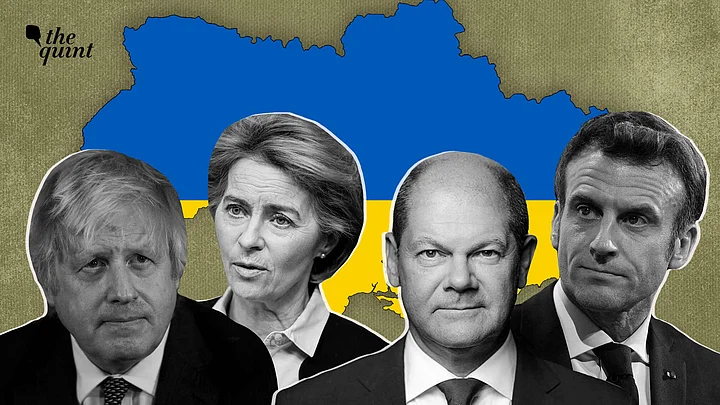"President Putin has been one of the greatest unifiers of NATO in modern history, so I guess that is one thing we can thank him for."
That is what White House press secretary Jen Psaki said during a press briefing on Monday, 28 February.
Psaki's claims may not be too far from the truth, with respect to Russia's invasion of Ukraine.
US President Joe Biden, on 28 February, led yet another virtual meeting with the European Union led by Ursula von der Leyen, the United Kingdom led by Boris Johnson, and other leaders of European countries, in order to reach an agreement regarding a common sanctions package against Russia.
Most of the European countries have already closed off the skies to Russian flights, and a number of Russian banks have already been cut off from the international payment portal known as SWIFT. The Russian central bank's assets are also expected to be frozen.
The unity being showcased by Europe is unprecedented. Analysts are saying that this unity has started to get under Putin's skin, even causing him to put Russia's nuclear forces on alert, violating his own government's nuclear doctrine.
European countries have, for the purpose of aiding Ukraine, started reversing policies that they had stuck to for decades.
The president of the European Commission, von der Leyen, while addressing the European Parliament on Tuesday, 1 March, announced that for the first time ever, the European budget is being used to "purchase and deliver military equipment to a country that is under attack", The Guardian reported.
A guarantee of €500 million in military aid and an extra €500 million in humanitarian aid was given to Ukraine.
She said the EU would ‘never accept’ the takeover of Ukraine and Putin’s actions had only served to make members more united.
Some of the countries that have reversed decades-long policies are Germany, Switzerland, Finland, and Sweden. We take a look at how they are assisting Ukraine in its war against Russia, and why their assistance is worth noting.
Germany
Perhap's the most siginficant policy shift in response to the Russian assault on Ukraine has been Germany's.
The policy shift has occured in three different sectors — finance, gas, and military aid.
Germany and other nations part of the EU were initally very skeptical of cutting Russia off from SWIFT, as they use that portal to pay for the gas imported from Russia.
Chancellor Olar Scholz, however, announced on 26 February, that the "people of Ukraine are fighting for freedom and democracy", and that Germany would support them.
Germany then joined the EU and the US in a commitment to ensure "that selected Russian banks are removed from the SWIFT messaging system", as quoted in a statement released by the European Commission.
The second policy reversal concerns gas.
After Russia recognised the independence of separatist-controlled Donetsk and Luhansk, Germany announced that the certification of the Nord Stream 2 pipeline had been put on hold.
This was a huge decision, given the German people's reliance on natural gas, and Germany's reliance on Russia for natural gas. You can read about Nord Stream 2 in detail here.
The third reversal was the one that deviated from German's decades-long policy of not exporting weapons to conflict zones.
Germany's legacy guilt with respect to the Second World War has often been cited as the reason for its restrictive arms export policy.
That policy has now been reversed, and the current chancellor also stated that "there was no other response possible to Putin's aggression".
Switzerland
In a sharp shift from the country's traditional neutral position during times of war and conflict, Switzerland has started to participate in the sanctioning of Russian banks and individuals.
For a better perspective of how important this move is, Switzerland maintained armed neutrality during both the World Wars, that is, it kept its troops and its weapons in case it got attacked, but it did not side with any of the alliances during World War I and World War II.
It had even stayed away from sanctioning Russia in 2014 when the latter had annexed Crimea.
But now, Switzerland is in "an extraordinary situation where extraordinary measures could be decided", President and Foreign Minister Ignazio Cassis said while announcing on 28 February, as quoted by Reuters.
In addition to closing its skies to Russian planes, Swiss sanctions have targeted President Vladimir Putin, Prime Minister Mikhail Mishustin, and Foreign Minister Sergei Lavrov, effective immediately.
Sweden and Finland
Finland has also reversed its longstanding neutrality policy after Prime Minister Sanna Marin announced on Monday, 28 February, that Finland will send weapons and ammunition to Ukraine.
The weapons shipment will include 2,500 assault rifles, 150,000 bullets, 1,500 anti-tank weapons, and even 70,000 food packages, the Defence Minister Antti Kaikkonen said, as reported by the BBC.
Finland was strictly neutral throughout the Cold War. It aligned with neither NATO nor the Warsaw Pact.
The country has maintained its neutrality, according to Reuters, since the Soviet Union in 1956 let go of a naval base it had leased in the southern part of the country after the Second World War.
Finally, there is Sweden, which has traditionally stayed away from military alliances, is not part of NATO, and was neutral during both World Wars and the Cold War.
The government announced on 28 February that it will, in light of Russia's aggression, send 5,000 anti-tank weapons to war-torn Ukraine.
It is the first time that Sweden would be sending weapons to a warring country since 1939.
The last time it had done so was during the Winter war, when it sent military aid to neighboring country Finland after an invasion by the Soviet Union.
(At The Quint, we question everything. Play an active role in shaping our journalism by becoming a member today.)
